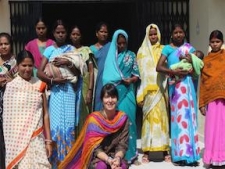Originally published on TechCocktail by Will Schmidt
Lisa Deluca, an Omni-Channel Technology Strategist and Master Inventor at IBM, first heard about an interesting program at the University of Texas at Austin (UT Austin) through her colleagues at work. As one who was trying to decide between pursuing an MBA or a Master’s in Technology, DeLuca was delighted to hear that The Master of Science in Technology Commercialization (MSTC) fused these two worlds tougher.
 UT Austin has, in effect, built their MSTC program to combine business, technology, and innovation into a one year program at The McCombs School of Business. Specifically, it focuses on preparing participants for the intersection of these worlds in their future careers.
UT Austin has, in effect, built their MSTC program to combine business, technology, and innovation into a one year program at The McCombs School of Business. Specifically, it focuses on preparing participants for the intersection of these worlds in their future careers.
Students like DeLuca meet on alternating weekends, either in person or telecommute in video software like Skype, to learn the business skills needed to compete in a global economy while continuing their full time jobs. Fusing entrepreneurship with education, the MSTC Program’s main aim is to help their students create innovative ventures and products.
“This program is like an MBA for more technical people,” says DeLuca. “It’s helped me in my day job to understand the market I inhabit. In my day to day I’m normally a developer, so I do coding and am not always exposed to the business side of things. Now I know why we make the decisions we do.”
Officially launched in 1996, the MSTC program has remained committed to the idea of getting a relevant degree into the hands of their students for 18 years at this point. The hope is that these students, in turn, might one day drive innovation on their own terms.
Students are taught how to identify and evaluate technologies with market potential, develop and present business plans, and profitably launch innovative products into the market. On average 80 students are accepted every year, with 50 percent coming from entrepreneurial backgrounds, 40 percent are corporate innovators, and 10 percent inhabit the tech commercialization space.
As a remote student out of San Francisco, DeLuca would join the class every other weekend with about 20 percent of the other students, who were also remote. It was just like a real classroom where she had to be on time and participate, lest her grade suffer.
Despite telecommuting, she was still able to tap into the best parts of the program, one of which, according to DeLuca, was that she could find the right people to ask her questions to. Traditionally, that’s a tough thing to do, but when DeLuca got access to an entire network of mentors and faculty through the MSTC program, the problem was all but diminished.
“It’s a lot of work, it’s a huge time commitment, but you learn a ton,” says DeLuca. “I got to spend time with some of the best professors I’ve ever known, and the time absolutely flew by.”
Of the class participants that graduate in May 2014 there have been 14 ventures launched. Two graduates even went on to be in the Texas Venture Labs incubator, based at UT Austin, and another graduate founded Beyonic to bring mobile payments to Africa.
Sure, there’s homework and you have to be engaged during class time, but as DeLuca says this is a unique experience you can’t get from other university programs. You’ll get to interact with different people, hear different stories, and embed yourself into the lives of people you might never have otherwise met.
“In life, it’s crucial to understand why things are more important than others and why a problem might be interesting to you over your colleagues,” says DeLuca. “The MSTC program gives you a different approach to looking at entrepreneurial life.”
Applications are currently open for the program, but they’re close on February 18, 2015. So, if you’re anything like DeLuca and you’re considering an MBA, a Master’s in Technoloyg, or anything similar, you might want to consider getting on board with the MSTC program.

